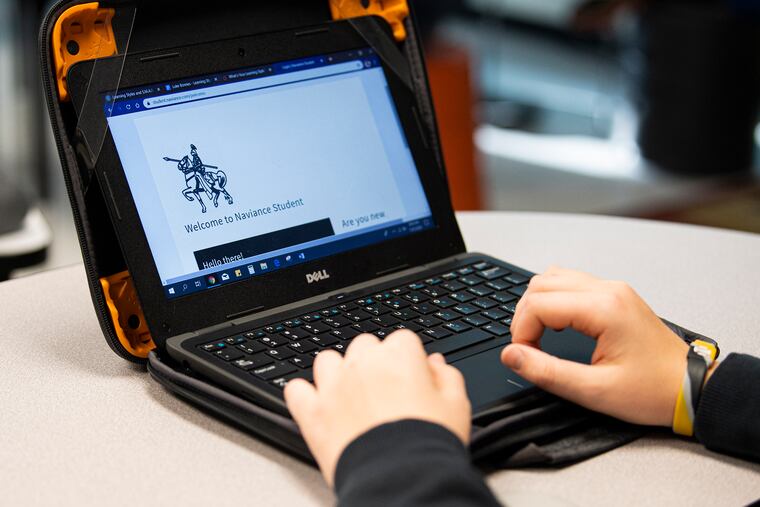As winter looms, this Philly-area school district could have virtual instruction if too many teachers are sick
"We can't open a school when we don't have enough people," said Quakertown Superintendent Bill Harner, whose district, like others, is battling illness and staffing shortages.

Bracing for the prospect of sickness and a substitute-teacher shortage upending its schools, the Quakertown Community School District has approved a plan to switch to virtual instruction if too many staff are absent.
If a “yellow alert” is called for a school in the Bucks County district, teachers will provide virtual instruction from their classroom or from home, and must be available during their regular work hours, according to an agreement with the district’s teachers’ union approved by the school board last week.
“The board’s not too excited about it, and neither are we. But we can’t open a school when we don’t have enough people,” Superintendent Bill Harner said.
Like other districts, Harner said, Quakertown is short on substitute teachers and aides. And it’s also battling high rates of illness that have teachers calling out — because they’re sick themselves, or they need to care for sick children at home. Last Friday, the district’s middle school was on the verge of being unable to open, administrators said.
“This is intended as a last-resort option” rather than having to close a school, and then make up days at the end of the school year, said Assistant Superintendent Nancianne Edwards. While some have questioned why the district is “trying to go backwards” to the type of schooling relied on amid surges in COVID-19, Edwards said, “It has nothing to do with that at all.”
But the approach reflects the pandemic’s lingering effects on the education system. Staffing shortages have plagued many districts, making it more difficult to fill holes when teachers are absent.
» READ MORE: Pa.’s teacher shortage is now a ‘crisis.’ Here’s how the state plans to bring in thousands of educators by 2025
More than 70% of Pennsylvania districts have reported staffing shortages — an increase of more than 40% from pre-pandemic levels, according to the Pennsylvania School Boards Association.
“Such a rapid increase has forced districts to take alternative approaches to delivering high-quality instruction to their students,” said Andrew Christ, the association’s managing director of government affairs.
Since the pandemic, some districts have turned to virtual instruction as an alternative to traditional snow days — an option the Pennsylvania Department of Education allows for up to five days per school year. Edwards said Quakertown is seeking the department’s approval for its plan under a different program that the state used to authorize virtual instruction during COVID, and extended for this school year.
Under that program, the state doesn’t limit the number of days on which a school district can provide instruction virtually, Edwards said.
The number of staffing absences that could trigger a “yellow alert” in one of Quakertown’s schools will depend on the situation, Edwards said. An absent guidance counselor, for instance, “doesn’t necessarily create a safety issue.”
» READ MORE: New York City schools declared no more snow days. What’s Philly’s take?
But too many teacher absences can create problems if the district can’t fill in gaps with aides, combine classes, or move staff from one building to another.
“Principals are absolute magicians” at covering absences, Edwards said. But “there does come a point at which there just aren’t enough adults ... to feel we’re safely providing supervision.”
While Edwards said Quakertown is having more success attracting substitutes this year than last, it’s still facing challenges. To address that issue, the school board also last week approved an agreement with its union to employ “floater teachers” who would be hired without a specific assignment. Those teachers would receive a salary and benefits — a more attractive position than serving as a substitute and being paid by the day, Edwards said.
“Optimistically, these strategies will work together,” Edwards said. As for “yellow alert” virtual days, “my hope would be that we never have to call one the entire year.”